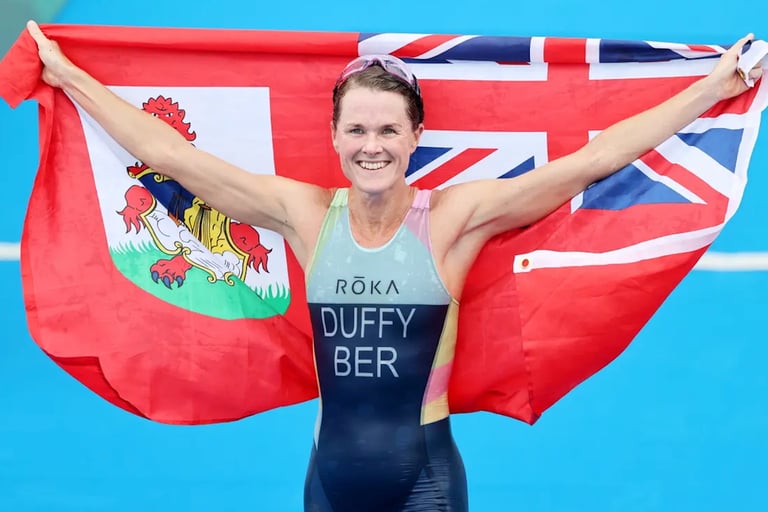The BOT's at the Tokyo Olympics: eleven competitors, one gold and one silver
At the 2020 Tokyo Olympics, Flora Duffy famously became the first Bermudan to win an Olympic Gold medal, and Bermuda became the smallest territory ever to win an Olympic event.
NEWS FROM THE OVERSEAS TERRITORIESBERMUDAANGUILLA
At the 2020 Tokyo Olympics, Flora Duffy famously became the first Bermudan to win an Olympic Gold medal, and Bermuda became the smallest territory ever to win an Olympic event. But Duffy was not the only Olympian from a British Overseas Territory to win a medal in Tokyo: Zharnel Hughes of Anguilla won silver as part of a men’s 4 x100 relay team. But he was running for Team GB, GBR, or Great Britain and Northern Island, whichever you prefer to call it. It’s an unusual and inconsistent arrangement.
“Team GB” is not just Britain or the UK. The brand covers the Isle of Man, Jersey, Guernsey, and all the British Overseas Territories except three. These are Bermuda, the British Virgin Islands and Cayman Islands, who each enter a team in their own right. This was Bermuda’s 19th Olympics, and Duffy’s medal follows on from the success of boxer Clarence Hill, who won a bronze for Bermuda in 1976.
Since BVI became the last OT to be admitted to the Olympic club in the early 1980s, the International Olympic Committee has become more of a closed shop. Perhaps it is due to concerns about sovereignty disputes, but new applications from OTs are now denied, and the British OT athletes outside the favoured three territories, have to compete for Britain This is of particular annoyance to Gibraltar and the Faroe Islands. Gibraltar is a similar size to BVI, and the Faroes is far larger. Both have complained.
But Gibraltar only became FIFA affiliated after a struggle, and Chief Minister Fabian Picardo has said that: ” the International Olympic Committee should be ashamed of itself for blocking Gibraltar’s application” and for also refusing to go to the Court of Arbitration for Sport. “If a fair and objective international tribunal was allowed to determine our original application to join the IOC, it would and could only reach one conclusion. This is the same conclusion which the Court of Arbitration reached in respect of our application to join FIFA.”
So, for the moment, there is no Gibraltar team, and this is a problem. Cayman Islands, Bermuda and BVI combined sent nine competitors to the Tokyo Olympics, three of who made the final of their event. The others, collectively, sent just Zharnel Hughes. Team GB is the at the very pinnacle of international sport and is very difficult to get into. Several athletes, including the sprinter Delano Williams of Turks and Caicos Islands, who qualified for Rio ahead of Hughes in 2016, fell short in this year’s trials.
The confusion this means everyone can claim the success. Bermuda is in the North Atlantic but competes in the regional CARIFTA and CFC games. Duffy could, therefore, be claimed by the Caribbean. The CARICOM Secretary-General, Irwin LaRocque, said that Duffy’s win was “another example of Caribbean excellence and further evidence of the ability of small states like ours to compete and be successful in the global arena.” Would the Jamaica-based Zharnel Hughes have got the same praise, running for GB, had he won his individual event? Is Anguilla not getting the attention it deserves? The records will show that in 2021 San Marino replaced Bermuda as the smallest nation ever to win an Olympic medal. But Anguilla is half the size of San Marino, and it has a silver.
None of this a problem for the athletes, and if you can get into the GB team, there is a level of support available that could not be obtained on a small island. Hughes has represented Anguilla at Junior level, but won the Commonwealth 100 metres running for England. He is also a European champion. “I have always known if I was to run at the Olympics, it would be in a British vest, and that is how I have always dreamed it would be”, he once said.
Duffy, a Triathlete, is as happy running for Bermuda as Hughes is for GB. “So many people have connections to Bermuda and realise how special this is,” she said, “it’s not just my medal; it’s our medal.” But she is still getting a lot of attention in Britain despite declining to join the GB team.
“There would have been a lot more funding and support if I had chosen to represent Britain” she said, “but being with Bermuda, I was allowed to forge my own path, go through ups and downs, and take some time off sport to allow myself to develop as the racer that I am. I don’t think I would have been allowed to do that in the GB programme. I had to do what my heart said and, truthfully, crossing the line for Bermuda has always been the most special.”
Duffy also talked about hearing the national anthem “I have family in England, and that’s special, so it is kind of nice that when God Save the Queen is played, it honours my British and Bermudian roots.” But not everyone thinks so. BVI has decided to swap the British anthem for its own territorial song, for this and future games.
In total, there were 11 athletes born in the British Overseas Territories competing in the Olympics. Four from the Cayman Islands, Three from BVI, two from Bermuda, and one from Anguilla. Who is the eleventh? Take a bow Alston Ryan, who was born in Montserrat, but represents Antigua and Barbuda. Ryan moved to Antigua as a small child and is currently based in London, but he is a son of the Montserrat soil and an Olympian. These are two honours that stay with you forever.


